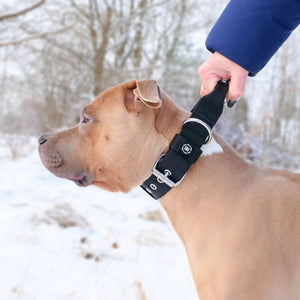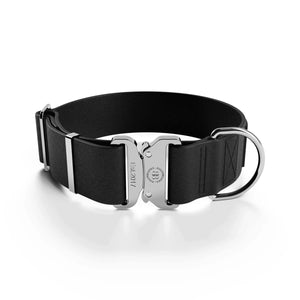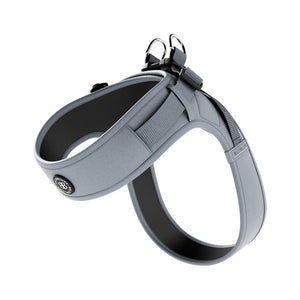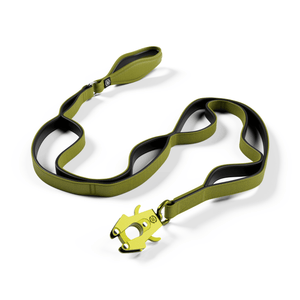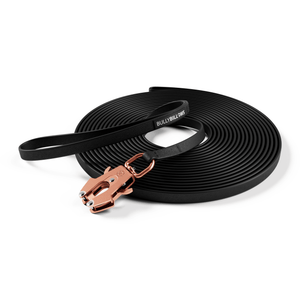Ever feel the weight of the world on your shoulders? Maybe it's that overwhelming to-do list or the endless stream of work emails. While some turn to meditation or a quick jog for relief, there's a fluffy, four-legged solution that might be just what the doctor ordered.
This isn’t just hyperbole, either. In 2023, UK animal welfare charity, Dogs Trust, conducted a National Dog Survey, which saw a whopping 400,000 responses from UK dog owners.
An incredible 96% of respondents agreed that owning a dog is good for their mental health, and 89% said their dog provides emotional support. A remarkable 98% stated that their dog made them feel happy.
So what exactly is it about dogs that makes them so good for our mental health? Let’s get into it.
1. Physical health improvements
It’s no secret that one of the best ways to clear your head is to get out for a walk, but sometimes that is easier said than done.
When you own a dog, a sedentary lifestyle becomes a thing of the past. Be it a sunny day or a wintry rainstorm, your pooch needs to get out and stretch their legs, so you have to go too.
Dog owners find themselves heading out for daily walks or runs with their furry companions, transforming exercise from a mundane chore into a fun routine. It’s like having a personal trainer that never takes a day off.
And it’s not just your dog that gets to reap the benefits. Regular physical exercise not only keeps you fit, but also releases endorphins, the body’s natural stress relievers.
The National Dog Survey discovered that 89% of people said owning a dog made them more active, which in turn made them happier. A win-win situation if ever there was one.
2. Becoming your new best friend
Dogs make the best friends. They’re always there to greet you with wagging tails at the end of a long day, but it’s not just them who enjoy the company. Companionship is incredibly valuable to our mental health.
Even those language barriers do little to affect it. The Dogs Trust found that 80% of people said they are confident reading their dog’s body language.
This companionship is especially valuable for older individuals or those who live alone. Caring for a dog makes you feel wanted and needed, creating a bond that lifts your spirits and brings joy to everyday life. There's something deeply comforting about knowing that your loyal companion is always by your side, ready to provide love and support.
3. Reducing anxiety
Do you struggle with anxiety? Your dog might be the perfect antidote.
The mere presence of a dog has been proven to help ease the burden of anxiety. Whether it’s the rhythmic sound of their breathing, the warmth of their body against yours, or the gentle nudge of a nose encouraging you to pet them, these small interactions can have a big impact on your stress levels.
Studies have shown that petting a dog can reduce cortisol, the stress hormone, and increase oxytocin, the bonding hormone. So while your faithful companion might just be looking for a pleasant head scratch, you can also relieve yourself of some negative hormones at the same time.
It's amazing how something as simple as a cuddle with your dog can transform your mood and bring a sense of calm.
4. Confidence boost
Dogs are great listeners. They offer unconditional love, and are always there to lend a furry ear.
This non-judgemental companionship can significantly boost your self-confidence, especially if you feel isolated or misunderstood. Dogs create a safe space where you can be yourself without fear of judgement.
This confidence boost goes beyond the personal pet therapist sessions to the great outdoors. Your dog can be the icebreaker that leads to a vibrant social life. 58% of people surveyed in the National Dog Survey said that owning a dog reduced their social isolation.
Walking your dog often leads to spontaneous social interactions. Dog owners frequently stop to chat with each other, sharing tips, stories, and sometimes even forming lasting friendships. Beyond that, pet shops, training classes, and outdoor events for dog lovers are all fantastic places to meet new people.
5. Adding structure to your day
Dogs thrive on routine, and this can be incredibly beneficial for their owners who may lack the stability of a daily structure.
Feeding, exercising, and caring for a dog adds structure to your day, helping you feel more grounded and focused.
This routine gives your day purpose and a sense of achievement, which are vital for mental well-being. It’s like having a daily to-do list that’s full of love and wagging tails.
Knowing that your dog relies on you for their needs helps to instil a sense of responsibility and accomplishment. It also provides a healthy distraction from life's stresses, as you focus on nurturing and caring for your loyal companion.
6. Autistic support
Autism is an often misunderstood condition that affects how people see and interact with the world around them. It is a complex spectrum that varies from person to person, making support difficult.
But once again, dogs come to the rescue. They provide a unique kind of unconditional relationship that can help autistic individuals build social skills and confidence. They offer a sense of calm and reassurance, which can be especially beneficial when feeling overwhelmed.
Autistic children with sensory issues can involve their dogs in sensory integration activities, helping them get used to different textures, smells, and sounds in a safe and comforting environment.
Research from the University of Lincoln found that autistic children experienced fewer meltdowns in the presence of a pet dog, and their parents stress levels are significantly lowered.
In adults, the University of Lincoln discovered that owning a pet dog could have a huge impact on their mental health, with a number of those questioned reporting that their dogs had prevented them from taking their own lives. The emotional support provided by a dog can be a lifeline for those struggling with intense emotions.
7. ADHD benefits
Attention-deficit/hyperactivity disorder is another condition that dogs can play a role in improving.
For individuals with ADHD, the structure, and routine that a dog requires can be particularly helpful. Managing a dog’s responsibilities, such as feeding, walking, and keeping track of their needs, can translate into improved time management and organisational skills in other areas of life.
In children, research shows that ongoing interactions with dogs can see a reduction in inattention, and improvements in social skills and self-esteem. The energy and playfulness of a dog can also provide a healthy outlet for hyperactive behaviours, helping to channel energy in a positive way.
8. Dogs and Dementia
Dementia and Alzheimer’s disease are just two of the serious diseases that can affect older people, severely impacting their daily lives, including a decline in memory, and changes in thinking and reasoning.
However, dog ownership can work wonders in some very interesting ways. Studies conducted by HABRI, the human animal bond research institute, found that the human-animal bond can play an important role in improving the quality of life for people living with Alzheimer’s or dementia.
In a pilot study, nursing home residents with dementia who participated in animal-assisted therapy (AAT) showed statistically significant decreases in agitated behaviours, and increased in social interaction post-test.
Furthermore, a six-week AAT intervention with dogs showed that AAT was efficient in improving cognitive function in residents with long-term mental illnesses.
Show your furry friend you care with BullyBillows
Our perfect companions do an awful lot to help pick us up, so don’t forget to return the favour.
At BullyBillows, we offer a range of accessories designed to keep your furry friend safe and comfortable. Explore our dog harnesses, collars, and leads, all crafted to the highest standards.
For more news, advice, and product buying guides, check out our blog.
Dog Exercise: Needs By Breed | The Ultimate Guide to Dog Training Must-Haves | Dealing With Puppy Behavioural Problems








